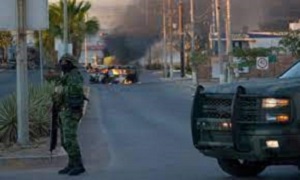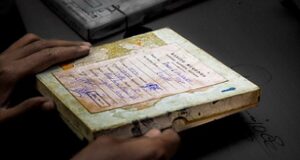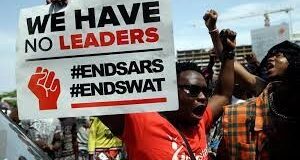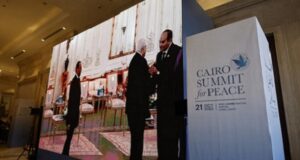January 07, 2023
At least 29 people killed in Culiacán as drug cartel gunmen fight bloody battle to stop transport of El Chapo’s son after arrest

A cargo vehicle in flames after clashes between federal forces and armed groups in the city of Culiacán. Photograph: Juan Carlos Cruz/EPA
By Tom Phillips and Analy Nuño in Guadalajara | The Guardian
Álvaro Arandas was approaching the check-in counter at Culiacán international airport when the pandemonium began.
“You could hear the shooting – huge blasts, so much noise,” said the Mexican businessman, who had planned to board a flight to the eastern city of San Luis Potosí.
Instead, Arandas found himself scrambling for cover as security forces and cartel gunmen fought for control of an airfield that had become the latest frontline of a Latin American drug conflict that claims tens of thousands of lives every year.
“There was panic … people ditched their bags and their phones, they ditched everything, in order to take shelter,” the 32-year-old remembered of the clashes at just after 8am on Thursday.
Twenty-four hours later, Arandas remained stranded inside the airport, as Mexican troops battled to regain full control of Sinaloa’s state capital after the arrest of one of the country’s most wanted men, Ovidio Guzmán, sparked a day of bloodshed and chaos.
At least 29 people lay dead, including 10 members of the military and 19 alleged cartel shooters, while 35 soldiers were wounded.
And Guzmán, the 32-year-old son of former Sinaloa cartel chief Joaquín “El Chapo” Guzmán, was behind bars in Mexico City after the latest bloody chapter in the history of his family’s north-western domain.
“Nobody is above the law,” Mexico’s security chief, Rosa Icela Rodríguez, declared on Friday as she celebrated Guzmán’s detention on the eve of next week’s visit by Joe Biden.
Culiacán’s day of drama began at about 4.40am on Thursday, according to the local newspaper Noroeste.
Thirty-five miles north of the capital, near a rural fishing community called Jesús María, security forces claimed they had spotted a convoy of around 25 cartel vehicles in which their target – AKA “El Ratón” (The Mouse) – was believed to be traveling.
Seven soldiers were killed in the ensuing gun battle between troops and gangsters with .50 caliber machine guns desperate to avoid the arrest of Guzmán, an alleged cocaine, marijuana and methamphetamine trafficker for whose arrest the US had offered a $5m reward.
A Black Hawk gunship pummeled one target with a 3,000-shots-per-minute, six-barrel machine gun similar to those US troops used in Vietnam.
Eventually, Guzmán was arrested – but worse was still to come, as cartel gunslingers marauded across Sinaloa state, torching vehicles, blocking roads and trying to seize control of Culiacán’s airport to stop authorities extracting their leader.
“We are asking citizens not to go out,” Sinaloa’s security secretary, Cristóbal Castañeda, tweeted as the mayhem spread. “We will give you more information when we can.”
The former Drug Enforcement Agency (DEA) chief Mike Vigil said Mexican authorities were partly responsible for the cartel’s response to Guzmán’s arrest.
When the drug boss was briefly detained in October 2019, president Andrés Manuel López Obrador controversially ordered troops to free him after gangsters brought the city to a standstill in a day remembered as Culiacán’s “Black Thursday”.
“We do not want war,” López Obrador, who is best known as Amlo, said at the time.
Vigil said Amlo’s decision had sent a clear message to the leaders of Mexico’s two most feared organized crime groups, the Sinaloa and Jalisco New Generation cartels, “that if a leading member of the cartel was captured and you generated wholesale violence, there was a good possibility that they would be released”.
So it was that on Thursday morning, Sinaloa gunmen decided to raise hell.
“Obviously, they have developed a plan to seal off the entire city if they need it,” Vigil said. “The reaction is equivalent to any well-trained military. They know exactly what they need to do. Everybody has responsibilities.”
Part of their plan appears to have been commandeering Culiacán’s airport and preventing military aircraft from landing there to fly their high-profile prisoner out.
As Arandas arrived at check-in, gangsters opened fire on both military and civilian planes – some still in flight – as well as airport buildings, Mexico’s defense secretary, Luis Cresencio Sandoval, told reporters on Friday.
“Two airforce planes … had to make emergency landings,” after being hit by “a considerable number” of cartel bullets, Sandoval admitted in a breathtaking official account of the war-like violence.
The targeted planes included Aeroméxico’s 8.24am flight to Mexico City, whose bewildered passengers were filmed crouching for cover between its dark blue seats as the assault unfolded around them. “Why?” one frightened child can be heard asking a parent.
Some analysts believe Guzmán’s arrest was intended as a gesture to Biden, whom Amlo is scheduled to meet in Mexico City on Monday to discuss issues such as migration and security, including Mexico’s role in the US fentanyl crisis.
“Right out of the Amlo playbook,” one former senior US law enforcement official in Mexico told Vice. “Plays us like a fiddle.”
Security expert Óscar Balderas said the capture would allow Amlo to signal to the US that Mexico was capable of dealing effective blows to organized crime. Guzmán was also a domestic “trophy” Amlo could use to claim that his “abrazos no balazos” (hugs not bullets) security policy – which puts fighting the social roots of crime above violent confrontation – was working. “It’s a demonstration that his hugs, not bullets strategy isn’t a strategy that means impunity.”
Vigil called the capture of Guzmán – who was spirited to Mexico City by helicopter – “a victory for justice and the rule of law”.
But he said the Sinaloa cartel was such a vast, horizontally run organization that his arrest was unlikely to make a major difference to its illegal operations.
“They operate in six of the seven continents. The only continent they don’t operate in is Antarctica because penguins don’t have money to buy drugs,” Vigil joked, adding: “[This is] not going to have any impact on the violence in Mexico or the drugs coming into the US, especially fentanyl, which is the major crisis that we have.”
By Friday afternoon, the violence appeared to have subsided in Culiacán. The city’s ghostly streets began to fill as cartel roadblocks were dismantled, although the state security secretary told locals to drive with their windows down if they were tinted.
Few expect the calm will last long. Some fear a power struggle between a weakened Sinaloa cartel and its Jalisco rivals. Others suspect a showdown is brewing between El Chapo’s four sons, who are known as Los Chapitos, and gangsters loyal to the legendary cartel leader Ismael “El Mayo” Zambada.
Vigil warned that while normality may have returned to Culiacán’s streets, cartel bosses would soon order their “army of assassins” to take revenge on military officials and their families for Guzmán’s arrest.
“They will not let this stand,” he said.
 Banadir weyne:: Somali news :: Your source of news and information about Somalia Somali news
Banadir weyne:: Somali news :: Your source of news and information about Somalia Somali news



